Beginning of life in the United Kingdom for one of the pioneers of Manipuri emigrants overseas
- Fifth part of the book: Dr Mohendra's Memoir to be published -
Dr Mohendra Irengbam *
![My Book [Quest Beyond Religion] Launch at India International Centre, New Delhi. Nov 28 2005.](http://www.e-pao.org/galleries/images/misc/2021/07/Mohendra_20210710_1.jpg)
My Book [Quest Beyond Religion] Launch at India International Centre, New Delhi. Nov 28 2005.
As London soaked up a shiny Spring Sunday I was enjoying the highlights of the city, travelling by bus and the Tube (Underground train) for experience. It was fascinating. Soon fascination tipped over into curiosity. It was extraordinary that there were so many black people driving the famous red double-decker buses of London transport.
In my near defunct memory, London was like Shangri-La in Tibet ("with streets paved in gold"), where everything was pleasant and you could get everything, and where there were white British folks moving about in suit and tie.
It was years after, that I learnt those black people were from the Caribbean and the Bahamas. They were recruited during the late 1940s, after the war, when there was acute shortage of manpower in Britain. This brings me to how so many coloured Immigrants had arrived in Britain, including me, as a legacy of its erstwhile empire.
Britain lost 450,770 (nearly 5 lakh) people during WWII, out of which 383,600 (nearly 4 lakh) died while serving in the military. Half of the civilian deaths were from London because of German bombing. For eight months the German Luftwaffe dropped bombs on London and other strategic cities across Britain, beginning towards the end of 1940. It was known as the "Battle of Britain".
It was a battle between the Luftwaffe and the British Air Force for air supremacy. The German espionage network was great so that the Luftwaffe selectively bombed that area of Manchester where there was a Jewish settlement.
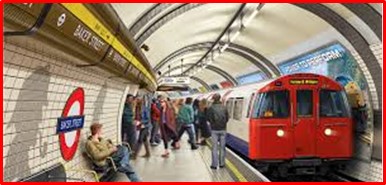
London Underground Train
Following the end of the War in August 1945, as coloured immigrants were pouring for better life into Britain, many British people migrated to countries, such as Australia, New Zealand and Canada for a better life. Australia then, promoted mass migration for the purpose of defence and development.
The total working population in the UK had fallen by 1.38 million. There was a drastic shortage of labour. Britain needed man power to develop its economy. Britain needed immigrants to rebuild the war-damaged country. British Government encouraged migration from Commonwealth countries. There were also immigrants from all over Europe, especially Eastern Europe, and Ireland.
The first black immigrants who were recruited, came from West Indies [Caribbean]. The first 500 immigrants arrived in June 1948 as temporary visitors, by a ship named Windrush. The ship used to be a German troopship. At the end of the war she was taken by the British Government as a prize of war and was renamed Empire Windrush. So, these black people were known as Windrush migrants. The British people in the beginning, were quite alarmed seeing so many black workforce.
These men came well-dressed in suit and tie and wearing felt hats – the dress style they expected English men to have. So did the women folks in two-piece suits and hats. They were trained mostly, to drive London buses and Tube trains, and the women, some of who were already trained nurses, were employed mainly in the National Health Service. The black or West Indians settled mainly in London, mostly in the borough of Notting Hill. Since then they have been having a Notting Hill Carnival every year.
There were great discriminations against the Black (including South Asians) and the Irish. Many landlords would not rent rooms to black and Irish immigrants. They had notices put up like 'Blacks and Irish are not welcome'. Racism against the Irish was mostly because they were staunch Catholics. The good thing about having an oriental look is that I have never encountered racial profiling in this country while my Indian class fellows did.
Some patients, especially older women would refuse to be treated by black nurses. The word "racism" became very widespread. The Conservative Government (1951-55) prohibited racial discrimination. In practice, it did not mean anything. Racial profiling exists and even now, except that using the word "Negro" or "Nigger" is punishable by law.
By the early 1950s the woollen and textile mills in the North of England, such as Bradford and engineering factories in the Midlands, such as Birmingham, were closing due to lack of workers. That shaped the pattern of immigration from the sub-continent of India (South Asia), Ghana and Nigeria. As a result, British cities became increasingly multicultural.
The word 'multicultural' became a bad phrase for the hoi polloi British people. Now, it is accepted as part of the social fabric, as the massive Pakistani Muslim population in Britain, supported by the world Muslim nations, would fight against any blatant discriminatory act.
The term 'Paki' has become an insulting and contemptuous word for people of Pakistani descent. Once, I was visiting a patient in a Pakistani family. In front of the flat two girls about 9-10 years were standing. One of them asked me "Are you Chini"? I said "no". Then, with thinly veiled exasperation, I asked her "Are you Paki"? She retorted, "Don't call me that".
In many Secondary schools, dominated by Pakistani Muslim children, Muslim activists have been trying to gradually Islamise the school with things like school uniform covering the girls' legs, holidays for Eid and the introduction of Halal meat for school lunches. When I was Chairman of the governing board of a secondary school in Bradford, as I represented local Muslim and Indian communities, I argued in favour of Muslim girls wearing trousers and later, for head scarf. I won. I also helped to introduce Diwali holiday for a tiny few of Indian pupils.
Over the years, as a few Asian immigrants who became economically solvent, were able to afford to live in the poor working class white neighbourhood in the cities and towns, as a family moved out of the small terraced houses, the next door white family would move out. Another Pakistani family would move in and the next white neighbour would move out, in a domino effect. Eventually streets and localities became solely Asian.
It those days, British people could not stand the smell of Asian spice-flavoured cooking, and habits such as spitting outside and loud conversations, to name a couple of malpractices. They were abhorrent to the local people.
As the UK economy picked up and boomed in the late 1950s and mid-1960s many coloured immigrants faced racist backlash, sometimes violent. There was a serious race riot in Notting Hill in West London, over the death of a black man in 1959.
About this time, the economic boom due to migrant labour, led to an increase in the disposable income among the British working class youth. A sub-culture of youth developed across these young men. Many of them were in low-paying jobs or, on the dole (on state benefits for the unemployed). They embraced working class fashion with T-shirt and worn-Levis. They cropped their hair short (Skinheads) and wore heavy working class boots.
They began frequent street-fighting and they became racists. They formed violent gangs and would attack Asians, blaming them for taking their jobs and sending money back home. They played the traditional nationalistic ideas of the working class. They turned against the Asian immigrant neighbours. Much later, many of them joined the far right nationalist organisations like the National Front and other Neo-Nazi groups in England.
Things began to simmer down a bit in the open anti-racism after the 1962 Commonwealth Immigration Act, which restricted immigrant number, by setting up a voucher system. This is that voucher with which I came to London. There was no problem with doctors. The needed a lot of doctors to run their National Health Service on the cheap. It was a hell of a lot cheaper to employ already trained doctors from abroad, rather than spending money to train their own doctors.
However, the average immigrant workers, who were working here at that time with the intention to return to their families back home in the long run had other ideas. They realised that once they had gone home, they might not be readmitted. So they brought their families to join them and decided to settle here permanently. The new law backfired. There were more immigrants rather than less. So another law, the 1968 Commonwealth Immigrants Act was passed by the Parliament. That restricted entry only to those with a father or grandfather born in the UK. For the doctors, the voucher was for indefinite stay in the UK and automatic right to British citizenship.
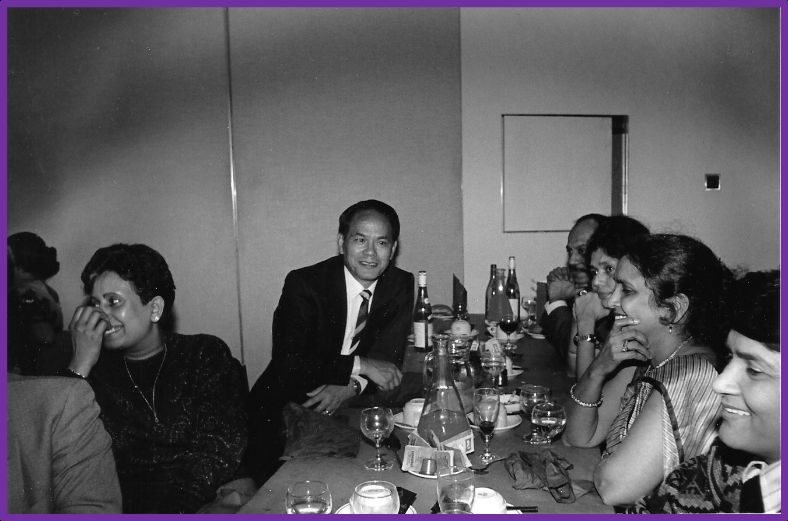
Fellow doctors from India at Annual Dinner of Overseas Doctors' Association, 4 of these are my class fellows.
The majority of doctors from the Indian subcontinent came to settle here. There were quite a few like me, who came to do post-graduation and return home. Many did. Many stayed here even after getting their degree. Some would return and come back as they could not find employment in their own country.
Most doctors got jobs in General Practice (Primary Health Care Service under the National Health Service). Hospital doctor specialists (Consultants) are known as Secondary care doctors. All the consultant posts, especially in popular specialities like Medicine and Surgery were filled by British doctors.
Even the results of the British post-graduate degrees such as MRCP and FRCS every year, depended on the possible vacancies of the existing Senior Registrar posts (training to be consultants after post-graduate qualifications) under the supervision of a consultant in the speciality, in general Hospitals. The idea was that no qualified post graduate doctor or graduate doctor would remain unemployed.
Most British doctors chose to go to General Practice.
Most Asian doctors also settled in General Practice as there were many vacancies, while only a few lucky ones became consultants in specialities like Geriatrics, which were not popular among the British doctors. By 1980s, there was a vast number of overseas doctors, mostly from South Asia, enough to form Overseas Doctors' Association (ODA) to parallel British Medical Association (BMA).
The life of junior doctors in those days in England was at small hospitals in the provinces where the consultants had no interest in teaching the juniors to qualify for advanced studies. We were just a pair of hands. It was all work and self-learning. It took me a couple of years even to pass the first part of the MRCP examination as I had to begin relearning the basics of medicine all over again.
A junior or trainee doctor was allowed to stay for only six months in that speciality at one hospital. We had to apply for a job every six months at different hospitals all over the country, looking up in the BMJ that advertised vacant posts. At that time, my SHO [Senior House Officer] pay was £70 per month, with free food and lodging.
After 3 months I bought a small used (second hand) car, an Anglia for £90 from an Indian doctor who was leaving UK to go back to India after he had his MRCP. As I was driving at home in Imphal, I believed I could drive a car here, with my Indian Licence. I did know anything about the country's Highway Code – a vital part of driving. It has many signs with various shapes and colours that meant different things. I did not know any of them. Nor did I know what dual carriageway meant.
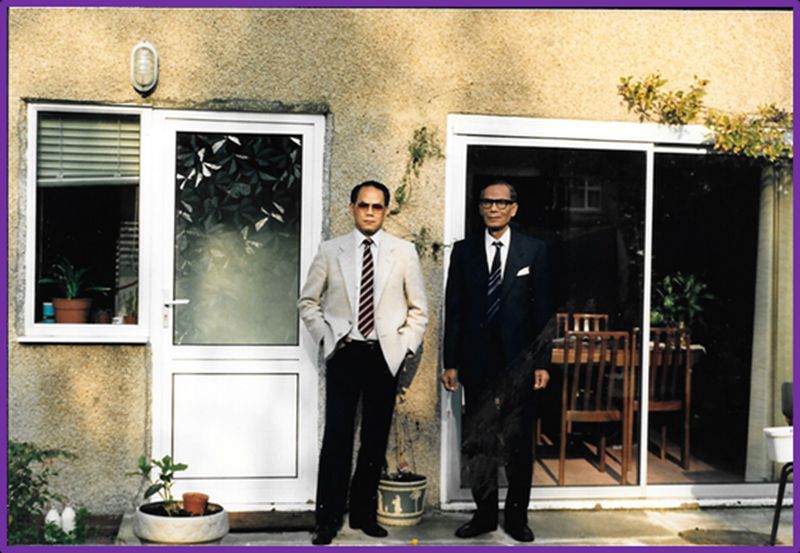
During my late brother Gokulchandra's visit, in my back garden in 1985
Everybody can drive a car, but driving according to the Highway Code is quite difficult to learn. The code sees that you can drive safely by following certain rules. To begin with, I did not know they have such rules printed in a booklet. Since they drive according to rules nobody ever uses the car horn except to warn off a driver of another vehicle in case of his wrong manoeuvre. I was lucky I was not stopped by a policeman.
After another three months I left the Hospital where I met Margaret and moved to another hospital about 20 miles away. One evening I was driving back to the former hospital to see Margaret. I have never driven alone. Somewhere on the way, I was driving up a road, which I later knew to be called 'Dual Carriageway'. I did not know I was driving on the wrong side of the road until some people driving the opposite way, waved me to go back.
I looked around. I saw nobody driving my way, either In front of me or at the back. Then I realised the mistake. I turned off a slip road, came around and drove on the right road.
In another two months I took the driving test after taking 4 lessons from professional driving instructors and memorising the road signs. I failed the first time on a technicality. It was that when I was asked to turn right to another road with stop road markings, I was not doing it at a right angle. It meant, if a car was parking behind the stop line to exit, I would be cutting into the right front end of the car. I studied the Highway Code more seriously, and took a couple of lessons more from another driver. Hurrah! I passed the next time.
After I had moved to another hospital and having saved up some money, I went on a package holiday to Italy for two weeks with Margaret. She organised it. I had no knowledge that such a facility existed. We stayed at the seaside town of Sorrento, opposite the Isle of Capri that was the haunt of Hollywood celebrities, and made famous by the American song, which I used to sing quite a lot in Darjeeling:
'Twas on the Isle of Capri that he found her
Beneath the shade of an old walnut tree
Oh, I can still see the flowers blooming 'round her
Where they met on the Isle of Capri.
We visited Capri, Rome, Pompeii and Naples. They were breath-taking experiences.
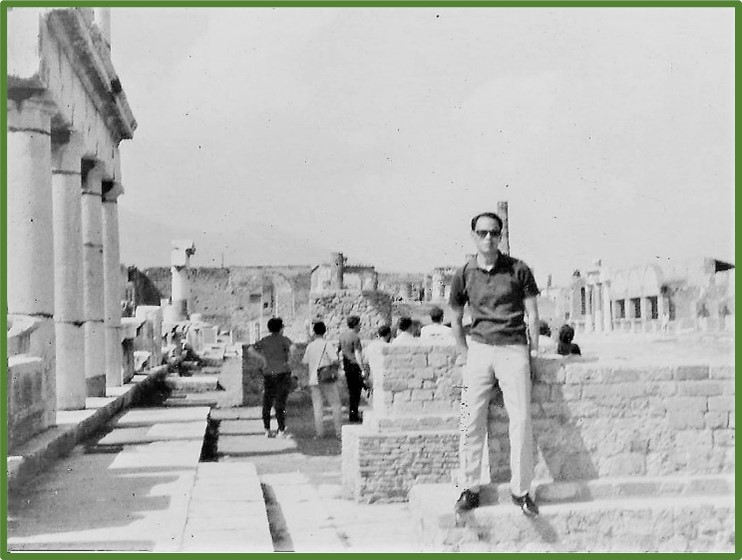
Author in Pompeii 1967
After two months I left the hospital for Edinburgh University to attend a course in advanced medicine for 8 weeks. My little car became very handy. At weekends, ie on Friday evenings, with high octane love, I would drive from Edinburgh to Newcastle, a distance of about 100 miles or 160 km [Imphal to Dimapur is 204 km) in 3 hours, and back on Sunday evenings, starting about 8 pm, across vast wastelands and without a hint of anxiety.
After finishing my study in Edinburgh I got another job as a SHO in Medicine at a hospital. Having trained enough, I came to work at a hospital in Bradford as a Specialist Registrar in Medicine, my salary was about £110 per month with free lodging and boarding. The job was then enjoyable. Four SHOs worked with me. I had only to attend to cases which they could not handle, and do a ward round with them once a week, in preparation for the Consultant's ward round next day. I had plenty of time to study.
At that time, the City of Bradford remained decadent, with dilapidated buildings and many woollen mills having been closed due to lack of man power. The surviving mills were run by immigrants mainly from Pakistan, and India.
The city of Bradford soon became known as the capital for Pakistanis in Great Britain, as more and more Pakistani men with their families as well as a number of illegal immigrants had settled there. These illegal immigrants would marry English prostitutes to be allowed to stay in the country. Once legalised, they would leave these women and bring their wives and family from back home. As the weddings in Pakistan were not registered the men could not be prosecuted for polygamy.
The large number of Pakistani emigrants are almost all from Mirpur in Azad Kashmir. It was Bradford where the Pakistanis burnt Salman Rushdie's book The Satanic Verses, which started a worldwide Muslim agitation. A fatwa on Rushdie's life was eventually, issued by Ayatollah Khomeini from Iran. Since then, Rushdie, who now lives in America, has been married four times, and he is now a multimillionaire.
When the Asians came to Britain in the 1950s, they were wearing suit and tie. Muslims as well as Sikhs shed their long hair and beards. Muslim women discarded their burqas and hijabs. After the Iranian Revolution in 1979, emboldened by Ayatollah Khomeini, and fortified by the Fatwa imbroglio with Salman Rushdie, Muslim men began to grow beards and do away with suit and tie. They were back to pyjama and long kurta, while women restored themselves to wearing burqa and hijab. The Sikhs followed suit and began to grow beards and wear turbans, but were not back to wearing salwar and kurtas.
Indian Hindus in Bradford are very few. It took years to organise a small temple and that also in a gable-end terrace house. Sikhs although very few, being hardworking and ingenious, had a biggish Gurdwara. For Muslims, financed by Saudi Arabia, they began to build large mosques all over the city. Most Indians, about 2.6 lakhs live in London.
These immigrants from Pakistan and India were mostly employed in textile industries in Bradford, Manchester, Lancashire and Birmingham. They worked in night shifts in the factories which the British people shunned, after all the hardships of WWII. They enjoyed going to the pub every evening. Going to the pub, drinking draught beer and socialising has always been the nucleus of British way of life.
Pub culture is an integral part of British life. They are the places to socialise and relax. There are peak times in the pubs, such as on the way back home after work, or in the evenings after their supper. Normal outings for young people start about 8 pm and go on till closing times at 11 pm. Once I had settled, I became 'accepted' as a local man in the local pub, partly because I was a doctor and partly because I knew their custom and etiquette. I became part of the community. I went to pub every night about 10 pm and met 3 or 4 close friends. We had just enough time to drink 2 or 3 pints.
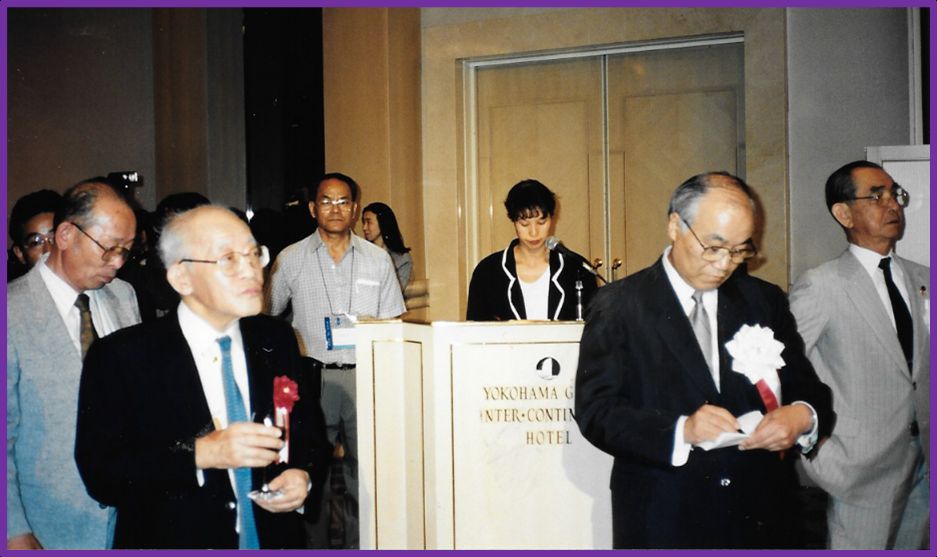
Author at World Conference on AIDS virus, Yokahoma, Japan 1993
While Bradford became a main city for Pakistanis, the Sikhs settled in Southall in Greater London, Glasgow and Birmingham. Leicester became the Gujarati City, especially after the influx of about 80,000 Gujaratis, who were thrown out by Idi Amin from Uganda in 1972.
The large immigrants from Bangladesh came in the 1970s, mostly from Sylhet. They started restaurants known as Indian restaurants at various places. The settled mostly in East London, which had previously been the home to Jewish migrants. In 1968, there was only one Indian restaurant in London, one in Glasgow and one in Newcastle. British people were not used to curry flavour. Now there are thousands. Indian curry dishes have become second national British cuisine.
British eating habits and etiquettes of dining are now quite relaxed. During the early years of my settlement in this country, they were quite formal. If you were invited to dinner at somebody's home you had to be dressed in your best suit and tie and women in their best outfits.
A dinner party in the UK is almost always an alcohol party. Alcohol is the celebratory symbol of choice, especially Champagne. Not that everyone drinks alcohol. Many women just partake soft drinks. After a few drinks and snippets of conversation exchanging pleasantries in the lounge, guests would repair to the dining room and sit at the table laid with cutlery, napkins and wine glasses for small parties. For large parties it would be a buffet.
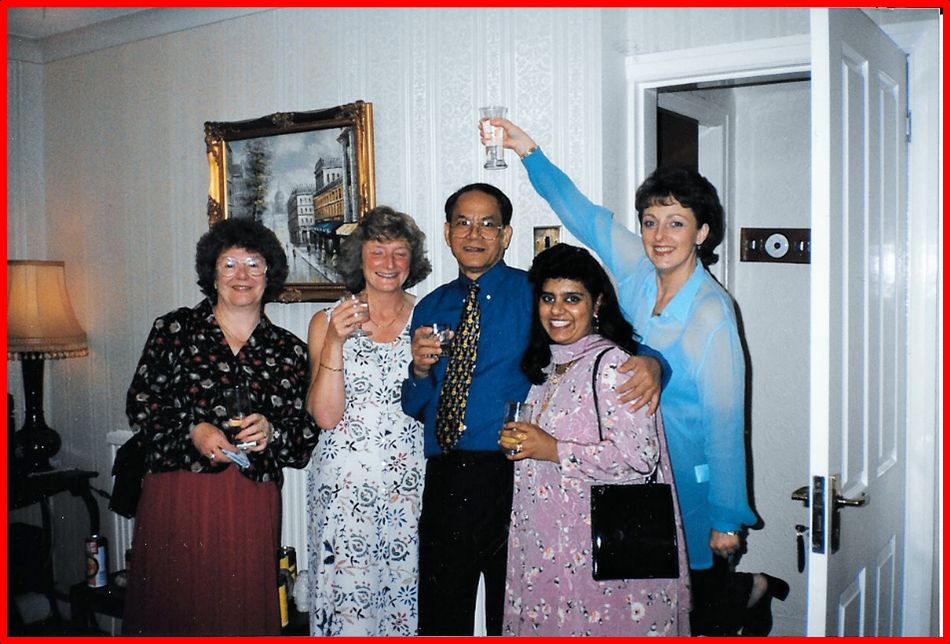
A buffet party at home
Having asked for preference, wine, either red or white would be served. Just shy of 2/3 (150ml) or 1/2 of the wineglass was poured into each glass. The idea was to allow the wine to 'breathe' a few minutes to release its aromas. Wines are served chilled [in an ice bucket] for white wines, and at room temperature for red wines. Wine is served with a meal to stimulate your appetite and make the food more enjoyable.
A starter is followed by a savoury main dish (entrée), usually meat or fish, followed by Pudding, now called Dessert. This is followed by coffee, served with Cheese (Stilton, Cheddar, Camembert etc) and biscuit (sugar-free) such as cream crackers, with butter in a dish and with a smaller butter knife.
The final drink is normally Brandy (Cognac), but may be any other liqueurs (such as Tia Maria, Baileys). The brandy is served in single measures and at room temperature, in a bowl-like short stemmed glass. The glass is so designed as to give the aroma of the spirit plenty of room to waft off, often by swirling. After this, everybody is merry but not 'drunk' as alcohol has been consumed mixed with solid food. Now it is time to go home with a dose of euphoria.
In general, most working class people drink beer and the upper class people drink shorts (spirits), at least in public. Women sip alcohol while men gulp it, especially beer. Only the cowboys quaff it. The alcoholic content of a pint of beer is equivalent to a large (double) peg (60ml). Alcohol in excess, will make you drunk and give you hangover the next morning (due to dehydration).Long-time excesses are injurious to health, which we all know.
Though the UN rates Australia as the second best country in the world to live in after Denmark, the UK remains the most popular country for migrants, and has a high number of migrants in comparison to other European countries. It is mainly because of economy and labour market.
Work and study are the most common reasons, making 71% of the main factors that encourage people to migrate to the UK. Apart from the English language, established networks, such as having people in their community, who can provide information on the migration process and help to finance the cost of migrations and so on, encourage migration.
Life here in the UK, has indeed been worth living in, particularly for me with a tipple in the evenings, which has determinedly, kept up the jolly banter.
Author's website: drimsingh.com
* Dr Mohendra Irengbam wrote this article for e-pao.net
The writer can be contacted at irengbammsingh(AT)gmail(DOT)com
This article was webcasted on July 10 2021 .
* Comments posted by users in this discussion thread and other parts of this site are opinions of the individuals posting them (whose user ID is displayed alongside) and not the views of e-pao.net. We strongly recommend that users exercise responsibility, sensitivity and caution over language while writing your opinions which will be seen and read by other users. Please read a complete Guideline on using comments on this website.







